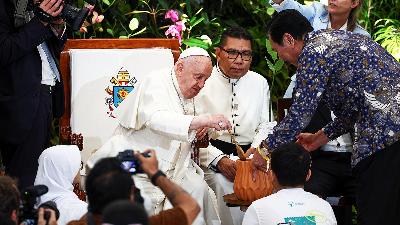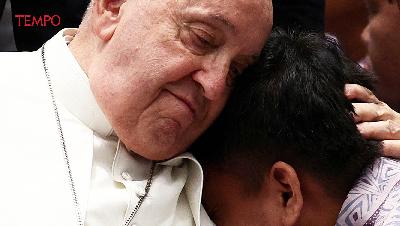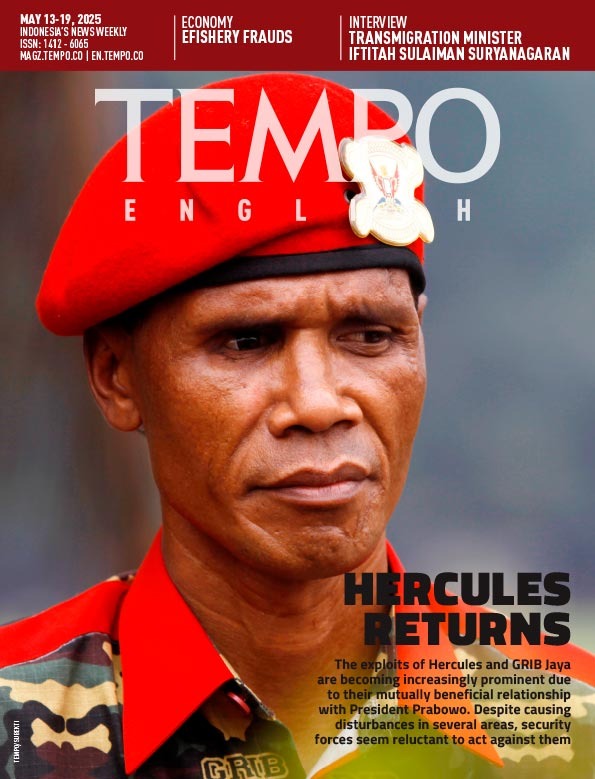The Pope and the Irony of Our Leaders
Monday, September 9, 2024
Pope Francis was enthusiastically welcomed on his visit to Indonesia. It was the simple journey of a religious leader and campaigner for social justice.
arsip tempo : 174718041257.

The most important qualification for being a leader is not wanting to be a leader.
~Plato
POPE Francis is a model of a leader who has chosen a simple life despite having the opportunity to live a life of privilege. As the leader of Catholics around the world with a vast following, he also has demonstrated the courage to speak out resolutely about democracy, the environment, and social justice.
Born in Buenos Aires, Argentina, on December 17, 1936, and originally named Jorge Mario Bergoglio, Francis is the 266th pope of the Roman Catholic Church. Elected after Pope Benedict XVI stepped down, he is the first non-European pope in a millennium.
The Vatican head of state visited Indonesia on September 3-6 as part of his Apostolic Journey, before travelling on to Papua New Guinea, Timor-Leste, and Singapore.
His visit to Indonesia was enthusiastically welcomed not only by Indonesian Catholics, but also by people of other religions. One place Pope Francis visited was the Istiqlal Mosque. There, he met with figures from a number of religions. The highlight of his visit was when he led a mass at the Gelora Bung Karno Stadium, attended by around 80,000 Catholics.
The Pope is not only a religious leader, but also a campaigner for social justice. A number of encyclicals, or doctrinal letters for church leaders and the Catholic faithful, which he has issued, reflect this concern. The encyclical Laudato si’ (Praise Be to You), issued in 2015, emphasizes the role of the church in addressing climate change. In 2020, through the encyclical Fratelli Tutti (All Brothers), Pope Francis called for universal fraternity and social friendship.
He urged leaders of the Catholic Church to bless lesbian, gay, bisexual and transgender people, but still opposed same sex marriage. To those who disagreed with his stance embracing gays and lesbians, he explained, “For years we have been busy discussing the rights and wrongs of divorce, family planning and same-sex couples, while the damage to our planet worsens and inequality between people grows like cancer.”
The simple lifestyle embraced by Pope Francis deserves praise. On his flight from Rome to Jakarta, he refused to use a private jet. Despite his advanced years, he decided to travel on a commercial airplane hired from ITA Airways to bring him together with 88 journalists from around the world. In Jakarta, the Pope refused to use a luxury bulletproof car, and chose instead to travel in a Toyota Innova, a car used by many people in Jakarta. And he stayed at the Vatican embassy in Jakarta, rather than at a five-star hotel.
It is regrettable that this spirit of simplicity and concern to all is not in line with the protocol regulations of Indonesia. The Pope’s desire to have dialogues with various groups of people could not be accommodated for security reasons. Concern for the safety of the Pope meant he was kept far away from the poor people he has long defended. And the plan for Pope Francis to visit a settlement for displaced people and an orphanage did not go ahead. Instead, an event was organized at which dozens of orphans and displaced people came to the office of the Indonesian Bishops’ Conference.
These ceremonial events provided an opportunity for senior officials, tycoons and top businesspeople to meet with the Pope—the very capitalists he has long criticized. In his speech, slightly sarcastically, he said that Indonesia’s greatest asset was harmony, not the resources extracted from under the ground.
The anti-violence stance of the Pope, who holds sway over the Catholics of the world, teaches us about modesty and responsibility behind the mandate of leadership. From The Two Popes, the touching fictional movie that endeavors to portray the relationship between Pope Francis and Pope Benedict XVI, we learn a valuable lesson: the most important qualification for being a leader is not wanting to be a leader.
In an insincere format, this stance is now being practiced by many world leaders, including in Indonesia. Political populism is presented as an effective way to win over voters and the majority. President Suharto once popularized the phrase ojo dumeh, a call for leaders not to be arrogant or act high and mighty—something contrary to what he practiced. President Joko Widodo uses phrases belum mikir (I haven’t thought about it yet) and Aku rapopo (I’m alright)—to imply a lack of desire for power and a relaxed attitude to attacks from political opponents.
But Pope Francis opposes this kind of populism: he has proved that power is a mandate that must be carried out by caring for others, not just the family.











